

US LNG is one more rival for Australia. The fiscal cliff conspiracy of fear. The fiscal cliff conspiracy of fear. Italian Prime Minister Mario Monti to Resign. Mr.
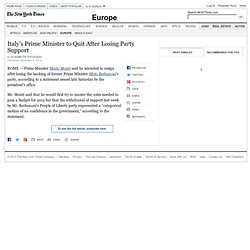
Monti said that he would first try to muster the votes needed to pass a budget for 2013 but that the withdrawal of support last week by Mr. Berlusconi’s People of Liberty party represented a “categorical motion of no confidence in the government,” according to the statement. Only hours earlier, Mr. Berlusconi said that he was ready to run for office again, promising to bring the change needed. During a two-hour meeting on Saturday evening, Mr. A year ago, Mr. Though some measures have fallen short of that aim, and have largely failed to stimulate economic growth, Mr. As the European Union pressed Italy to enact changes to lower its public debt and streamline its pension system and costly labor market, Mr. Mr. Monti to resign as Italy's prime minister after Berlusconi says he will run again.
Italy's Prime Minister Mario Monti, right, and Silvio Berlusconi last year.
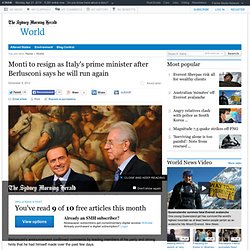
Photo: AFP Italian Prime Minister Mario Monti is stepping down, the president's office has announced, just hours after the man he replaced, Silvio Berlusconi, said he would run again for head of government. Monti "does not think it possible to continue his mandate and consequently made clear his intention to present his resignation," said the statement from President Giorgio Napolitano's office on Saturday. Berlusconi's announcement confirmed comments by leading members of his party and strong hints that he had himself made over the past few days. Italy's Berlusconi confirms political comeback.
Updated Sun 9 Dec 2012, 7:23am AEDT Former Italian prime minister Silvio Berlusconi has announced he is planning to return to politics and try to become the country's leader for a fifth time.
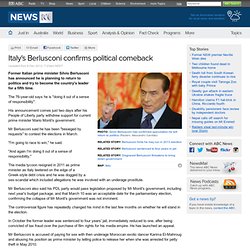
The 76-year-old says he is "doing it out of a sense of responsibility". His announcement comes just two days after his People of Liberty party withdrew support for current prime minister Mario Monti's government. Mr Berlusconi said he has been "besieged by requests" to contest the elections in March. "I'm going to race to win," he said. "And again I'm doing it out of a sense of responsibility. " Italy's Monti Announces Plans to Resign.
Rosella parent placed into receivership. Taste of the times . . .
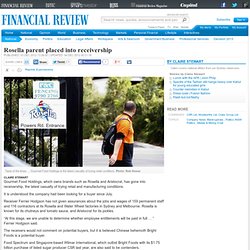
Gourmet Food Holdings is the latest casualty of trying retail conditions. Photo: Rob Homer Claire Stewart Gourmet Food Holdings, which owns brands such as Rosella and Aristocrat, has gone into receivership, the latest casualty of trying retail and manufacturing conditions. It is understood the company had been looking for a buyer since July. Receiver Ferrier Hodgson has not given assurances about the jobs and wages of 159 permanent staff and 116 contractors at its Rosella and Water Wheel factories in Sydney and Melbourne.
“At this stage, we are unable to determine whether employee entitlements will be paid in full . . . ” Ferrier Hodgson said. The receivers would not comment on potential buyers, but it is believed Chinese behemoth Bright Foods is a potential buyer. Food Spectrum and Singapore-based Wilmar International, which outbid Bright Foods with its $1.75 billion purchase of listed sugar producer CSR last year, are also said to be contenders. Kmart is set to get aggressive. Mining crunch hits profits – rate cut expected. Assistant Treasurer David Bradbury says the government has given the Reserve Bank “the room that it needs to cut interest rates.”
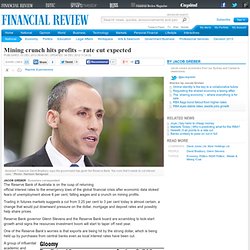
Photo: Harrison Saragossi Jacob Greber Economics correspondent The Reserve Bank of Australia is on the cusp of returning official interest rates to the emergency lows of the global financial crisis after economic data stoked fears of unemployment above 6 per cent, falling wages and a crunch on mining profits. Trading in futures markets suggests a cut from 3.25 per cent to 3 per cent today is almost certain, a change that would put downward pressure on the dollar, mortgage and deposit rates and possibly help share prices. ++ RBA Speech-What is Normal? Massive money-printing hits bond yields. National income slumps at fastest rate since GFC. Ditch surplus and spend more: McKibbin. Warwick Mckibbin on Wednesday.
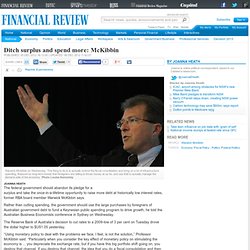
‘The thing to do is to actually extend the fiscal consolidation and bring on a lot of infrastructure spending, financed by long-term bonds that foreigners are willing to throw money at us for, and use that to actually manage the demand-side of the economy.’ Photo Louise Kennerley Joanna Heath The federal government should abandon its pledge for a surplus and take the once-in-a-lifetime opportunity to raise more debt at historically low interest rates, former RBA board member Warwick McKibbin says.
Income to fall as mining slump bites. The recent decline in commodity prices means the federal government will need to find additional savings to deliver a budget surplus this financial year, Treasurer Wayne Swan says.
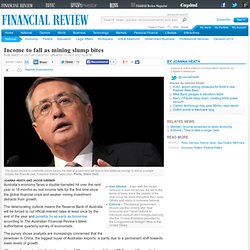
Photo: Glenn Hunt Joanna Heath and Jacob Greber Australia’s economy faces a double-barrelled hit over the next year to 18 months as real income falls for the first time since the global financial crisis and weaker mining investment detracts from growth. Australian national income falls as global downturn deepens. By Mike Head 8 December 2012 Australia’s national income dropped by 0.4 percent in the September quarter—another indicator of the intensifying slump that has hit most of the economy, compounded by a fall in mining commodity prices.
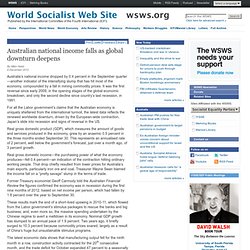
It was the first reversal since early 2009, in the opening stages of the global economic breakdown, and only the second decline since country’s last recession, in 1991. The historical significance of the gathering world slump. 4 December 2012 The significant reduction in the economic forecast of the 34-member Organisation for Economic Cooperation and Development (OECD) is the latest in a series of warnings by major international economic organisations of a global slump.
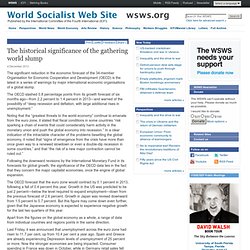
The OECD slashed 0.8 percentage points from its growth forecast of six months ago—from 2.2 percent to 1.4 percent in 2013—and warned of the possibility of “deep recession and deflation, with large additional rises in unemployment.” Noting that the “greatest threats to the world economy” continue to emanate from the euro zone, it stated that fiscal conditions in some countries “risk sparking a chain of events that could considerably harm activity in the monetary union and push the global economy into recession.”
The OECD forecast that the euro zone would contract by 0.1 percent in 2013, following a fall of 0.4 percent this year. Moreover, they have a profound historical significance. Seven lost years for England. UK Chancellor George Osborne has delivered an update on the budget and economy that confirms the UK as one of the weakest economies in the world, with seven lost years of economic growth.
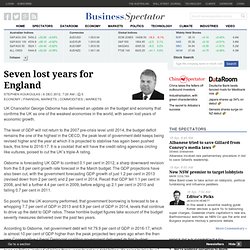
The level of GDP will not return to the 2007 pre-crisis level until 2014, the budget deficit remains the one of the highest in the OECD, the peak level of government debt keeps being revised higher and the year at which it is projected to stabilise has again been pushed back, this time to 2016-17. It is a cocktail that will have the credit rating agencies circling like vultures, poised to cut the UK’s triple-A rating. Osborne is forecasting UK GDP to contract 0.1 per cent in 2012, a sharp downward revision from the 0.8 per cent growth rate forecast in the March budget. The GDP projections have also been cut, with the government forecasting GDP growth of just 1.2 per cent in 2013 (revised down from 2 per cent) and 2 per cent in 2014. Banks: The Cash Rate and the Real Interest Rates.
In my monthly round up of stuff to do with the RBA’s interest rate announcement I as a rule show this graph: Now I must admit that by itself it is a bit misleading. It suggests the banks are making out like bandits, and are screwing mortgage holders royally. A million new jobs ain't what it used to be - The Drum Opinion. Find More Stories A million new jobs ain't what it used to be Greg Jericho Tony Abbott's plan to create one million jobs in five years is a political promise rather than an economic forecast, writes Greg Jericho. Last week Tony Abbott released a book which apparently gives us an insight into what an Abbott Government would look like. As it is just a collection of his speeches, there is little new content save the foreword in which Mr Abbott announces: "Within five years, I am confident that our economy can create at least one million new jobs.
" Australia’s Weakest Consumption Since 2010 Slows Growth: Economy. Australia’s economy slowed last quarter on the weakest consumer demand in 2 1/2 years and tighter government spending, validating the central bank’s decision to cut interest rates. Third-quarter gross domestic product advanced 3.1 percent from a year earlier after a revised 3.8 percent expansion in the April-June period, a Bureau of Statistics report released in Sydney today showed. RBA cut fails to curb $A. RBA governor Glenn Stevens says there are some positive economic signs, but the near-term outlook for investment outside of mining is relatively subdued. MARKETS SPECTATOR: NAB's time to shine. Moody’s backs local banks to bear up. BoQ share placement runs into trouble.
NAB faces investor ire before AGM. National Australia Bank chairman Michael Chaney told investors Cameron Clyne was one of the best chief executives in Australia and would be in the role for years to come. Photo: Bohdan Warchomij. Monwealth joins NAB to cut interest rates - will the others follow? The ANZ reviews its interest rates on the second Friday of each month, with the next review due on December 14. Insurer warns of higher premiums. Low interest rates could force insurance premiums higher. Photo: Paul Rovere INSURANCE Australia Group's commercial insurance arm, CGU, has warned that low interest rates could force it to increase business insurance premiums by as much as 8 per cent.
CBA takes real-time microscope to customer transactions. Though CBA’s systems overhaul is complete, Michael Harte plans to stick around for some time yet Tamara Voninski. Apple to return some Mac manufacturing to US. Apple’s chief executive Tim Cook, talks with NBC’s Brian Williams about the iPhone maker’s plan to bring back some of its Mac production back to the US from China. REUTERS. Top 10 M&A predictions for 2013. Tony Damian and Rodd Levy Herbert Smith Freehills partners Tony Damian and Rodd Levy provide Capital with their predictions of the major themes that will shape mergers and acquisitions in the coming year.
Battle of the internet giants: Survival of the biggest. Cities under increased duress. The joke that’s journalism. In its fanaticism about Prime Minister Julia Gillard, Australian conservatism has lost touch with real world notions of fact-based thinking and analysis.